Maggots in your kitchen? Sounds like a nightmare, right? But hold on. These creepy crawlies are going to make you wanna start composting.
Forget everything you thought you knew about compost systems.
Black Soldier Fly composting offers a unique solution for your household waste management, harnessing the voracious appetite of the larvae to rapidly break down organic matter.
Sure, they might give you the heebie-jeebies at first, but trust me, the benefits are worth facing your fears.
What are Black Soldier Flies?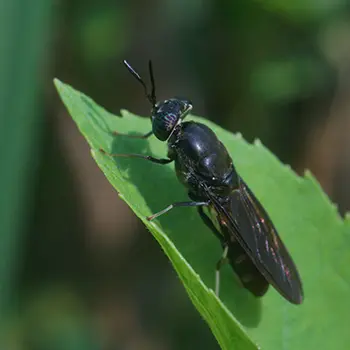
Black soldier flies aren’t your run-of-the-mill backyard pests. These industrious insects are nature’s recycling pros, and unlike those pesky houseflies, they won’t crash your summer barbecue or spread diseases.
BSFs go through four life stages:
- Eggs: Tiny, oval-shaped, and laid in clusters near decaying organic matter.
- Larvae: The workhorses of the BSF world, these voracious eaters do all the composting heavy lifting.
- Pupae: During this stage, the larvae transform into adult flies.
- Adult flies: Short-lived but crucial for reproduction.
Here’s the kicker – adult BSFs don’t even have functional mouthparts. Their sole purpose is to mate and lay eggs, making them the ultimate low-maintenance composting allies.
The Power of BSF Larvae
Now, let’s talk about the real stars of the show – BSF larvae. These little guys are like nature’s garbage disposals on steroids. They’ll chow down on: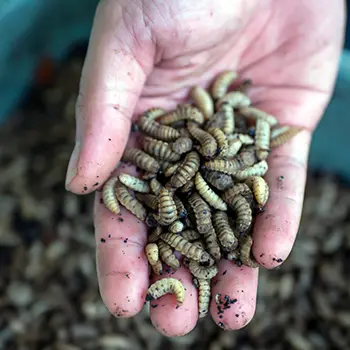
- Fruit and vegetable scraps
- Grains and bread
- Coffee grounds
- Even small amounts of meat and dairy!
But it’s not just about what they eat – it’s how much and how fast. Let’s break down their impressive capabilities:
- Rapid consumption: BSF larvae can eat up to twice their body weight in food waste daily.
- Diverse diet: They can process a wide range of organic materials, including those that traditional composting struggles with.
- Disease resistance: BSF larvae have antimicrobial properties that help suppress harmful bacteria in their feeding substrate.
- Self-harvesting: When ready to pupate, the larvae naturally migrate out of their feeding area, making collection a breeze.
Benefits of a Black Soldier Fly Composting System
Rapid Decomposition
One of the most significant advantages of BSF composting is the speed at which organic matter breaks down.
While traditional composting methods can take several months to produce usable compost, BSF larvae can process waste in as little as 21 days. This rapid decomposition is due to the crazy appetite of BSF larvae and their efficient digestive systems.
The accelerated process means you can produce more compost in less time, allowing for multiple cycles throughout the growing season. This quick turnaround is particularly beneficial for urban homesteaders or those with limited space who need to manage waste efficiently.
Odor Reduction
Despite their ability to process a wide variety of organic matter, BSF composting systems produce minimal odor when managed correctly.
The larvae quickly consume waste before it has a chance to rot and create unpleasant smells. This feature makes BSF composting suitable for urban or suburban settings where odor control is crucial.
Creates Nutrient-Rich Fertilizer
The end product of BSF composting is called “frass”. It’s like black gold for your garden! Packed with nutrients, frass will make your plants sing. But what exactly makes frass so special?
Let’s compare BSF frass to traditional compost:
Nutrient | BSF Frass | Traditional Compost |
Nitrogen | 4-6% | 1-2% |
Phosphorus | 1-2% | 0.5-1% |
Potassium | 1-2% | 0.5-1% |
But it’s not just about the NPK values. BSF frass also contains:
- Chitin: This compound, found in insect exoskeletons, can boost plants’ natural defense mechanisms.
- Beneficial microorganisms: Frass is teeming with microbes that enhance soil health.
- Trace minerals: Essential micronutrients that are often lacking in synthetic fertilizers.
Pest Management
BSF larvae create an environment that’s less attractive to common compost pests like fruit flies and house flies.
The presence of BSF larvae in a compost bin can deter other fly species from laying eggs in the organic matter. This natural pest control reduces the need for additional pest management strategies.
Potential for Animal Feed
Got chickens? Fish? Other critters? BSF larvae are like protein-packed smoothies for your animals.
They’re rich in essential amino acids and fats, making them an excellent supplement to traditional feeds.
Let’s look at the nutritional profile of BSF larvae:
- Protein: 35-40%
- Fat: 30-35%
- Calcium: 5-8%
- Essential amino acids: All present in significant quantities
This nutritional powerhouse can help you:
- Reduce feed costs
- Improve animal health
- Create a closed-loop system on your homestead
Space Efficiency
BSF composting systems can be designed to be compact and vertical, making them ideal for urban environments or areas with limited space.
Unlike traditional compost piles that require significant ground area, BSF bins can be stacked or configured to maximize space efficiency without compromising processing capacity.
Reduces Food Waste
Remember that guilty feeling when you toss spoiled produce? Kiss it goodbye! BSF composting turns your food scraps into a valuable resource.
This isn’t just about keeping your kitchen clean – it’s about making a real environmental impact.
Water Conservation
BSF larvae process organic waste in a way that retains moisture within the system.
This characteristic reduces the need for additional watering, which is often necessary in traditional composting to maintain proper moisture levels.
The water conservation aspect is particularly beneficial in arid regions or during drought conditions.
Is a Black Soldier Fly System Right for You?
Considerations Before Getting Started
Before you jump on the BSF bandwagon, let’s chat about a few things to consider:
- Climate: BSF thrives in warmer temperatures (optimal range: 75-85°F). If you live in a cooler region, you might need to get creative with heating. Consider:
- Insulated composting bins
- Greenhouse setups
- Artificial heating systems
- Space: From compact kitchen setups to larger outdoor systems, there’s a BSF solution for every space. Options include:
- Under-sink bins for apartments
- Backyard composters for suburban homes
- Large-scale systems for farms
- Regulations: Some areas have restrictions on BSF composting. Check with your local authorities before setting up shop. Key points to investigate:
- Zoning laws
- Health department regulations
- Neighborhood association rules
- Initial Investment: While startup costs vary, the long-term benefits often outweigh the initial expense. Consider:
- DIY systems: $50-$200
- Commercial units: $200-$1000+
- Potential savings on waste disposal and fertilizer
Vermicomposting vs. BSF Composting
When it comes to efficient organic waste management, vermicomposting and Black Soldier Fly (BSF) composting are two popular methods.
Each has its strengths, so let’s break down how they compare:
Factor | Vermicomposting | BSF Composting |
Processing Time | 3-6 months | 21 days |
Waste Types | Vegetarian diet | Omnivorous, including meat and dairy |
Temperature Range | 55-77°F (13-25°C) | Up to 95°F (35°C) |
Space Needs | Compact | Moderate |
Maintenance | Regular | Low |
End Products | Worm castings | Frass and larvae |
So, which do you prefer?
Well, that depends on your specific needs and situation. If you’re looking for rapid waste processing and don’t mind a slightly larger setup, BSF composting might be your jam.
If you want a compact, low-maintenance system and don’t mind waiting a bit longer for your compost, vermicomposting could be the way to go.
Remember, there’s no rule saying you can’t have both! Many composting enthusiasts use a combination of methods to maximize their waste processing and get the best of both worlds.
My choice? … Obvious! … Black Soldier Fly Composting System! … You?
Comment down below.
The Succulent Red Plant That Tastes Like Bacon (Video)

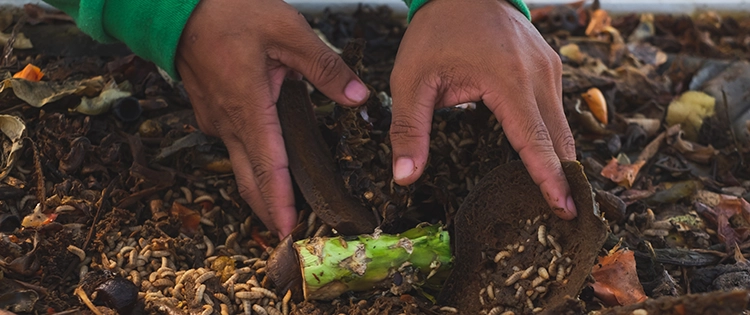
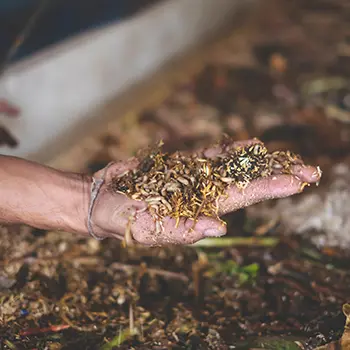
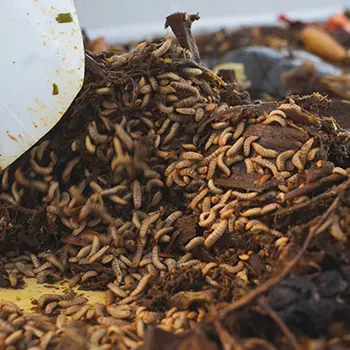
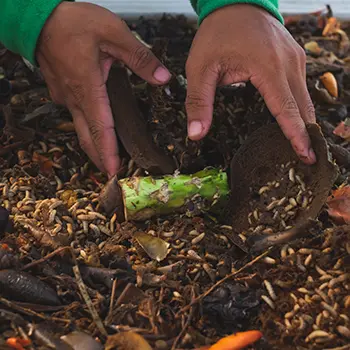









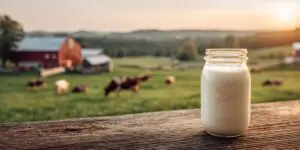
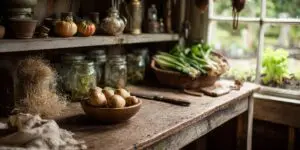
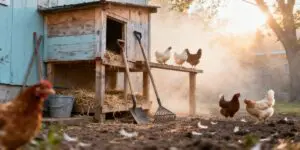
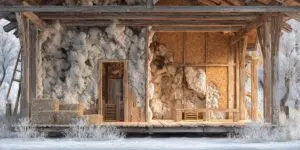
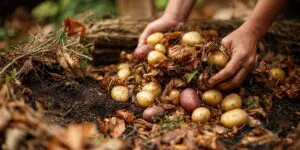
Thanks for the article.
After sourcing initial stock, how do they multiply since they are self harvested in a couple weeks?